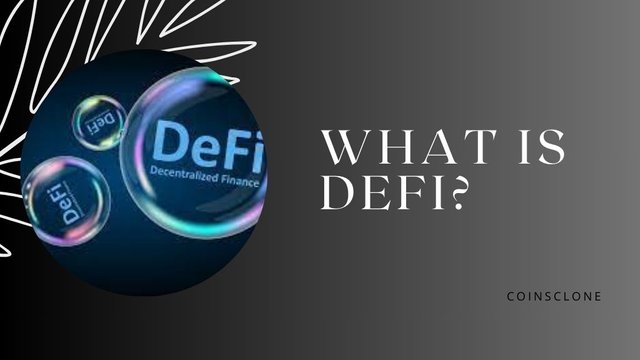Demystifying DeFi: A Game-Changer for Startups

Introduction
In the ever-evolving landscape of financial technology, one term has emerged as a game-changer for startups and the financial industry as a whole - DeFi. Short for Decentralized Finance, DeFi represents a paradigm shift in the way we think about traditional finance and offers innovative solutions to the challenges faced by startups. In this 1500-word exploration, we will delve deep into the world of DeFi, what it is, why it matters for startups, and how it can revolutionize the way businesses operate.
What is DeFi?
At its core, DeFi is a movement that aims to recreate traditional financial services - such as lending, borrowing, trading, and investing - using blockchain technology and smart contracts. Unlike conventional finance, which is centralized and often controlled by banks or financial institutions, DeFi operates on public, open-source, and decentralized blockchain platforms, most notably Ethereum.
Key Characteristics of DeFi:
- Decentralization: The absence of intermediaries like banks, allowing peer-to-peer transactions.
- Transparency: All transactions and smart contracts are visible on the blockchain, fostering trust.
- Security: Smart contracts and cryptography ensure a high level of security.
- Accessibility: DeFi services are open to anyone with an internet connection, bridging the global financial divide.
The DeFi Ecosystem
DeFi encompasses a wide range of services and products, and it continues to expand rapidly. Key components of the DeFi ecosystem include:
- Decentralized Exchanges (DEXs): Platforms like Uniswap and SushiSwap enable users to trade cryptocurrencies directly with one another, eliminating the need for intermediaries.
- Lending and Borrowing: DeFi platforms like Compound and Aave allow users to lend out their cryptocurrencies and earn interest or borrow assets by collateralizing their own.
- Yield Farming: Users can optimize their DeFi investments by providing liquidity to liquidity pools and earning rewards.
- Stablecoins: These cryptocurrencies, like DAI or USDC, are designed to maintain a stable value and are often used as a bridge between the traditional and DeFi worlds.
- Asset Management: DeFi platforms like Yearn.Finance offer automated yield optimization strategies, making it easier for startups to manage their assets.
Why Startups Should Care About DeFi
- Access to Funding: DeFi opens up new avenues for startups to access capital without the need for traditional venture capital or bank loans. Platforms like Initial DeFi Offerings (IDOs) and Decentralized Autonomous Organizations (DAOs) allow startups to raise funds through token sales directly from their target audience.
- Global Reach: DeFi transcends geographical boundaries, making it possible for startups to reach a global audience and tap into a vast market. Startups can attract investors and users from around the world without the need for a physical presence in different countries.
- Lower Costs: DeFi cuts out intermediaries, reducing transaction costs. Startups can avoid hefty fees associated with traditional banking systems, making it a cost-effective way to manage financial operations.
- Innovation and Collaboration: DeFi encourages startups to think outside the box and collaborate with DeFi projects to develop novel financial solutions. This collaboration can lead to innovative products and services that set startups apart.
- Transparency and Security: The blockchain technology underlying DeFi ensures transparency and security, which is especially crucial for startups dealing with sensitive financial information and customer data.
DeFi Challenges and Risks for Startups
While DeFi holds immense promise, startups should also be aware of the challenges and risks:
- Regulatory Uncertainty: The regulatory landscape for DeFi is evolving and varies from one jurisdiction to another. Startups must navigate this uncertainty and be prepared for potential legal challenges.
- Smart Contract Risks: DeFi relies heavily on smart contracts, which are not infallible. Vulnerabilities in these contracts can lead to significant financial losses.
- Volatility: The cryptocurrency market is notoriously volatile. Startups engaging in DeFi should be prepared for rapid fluctuations in asset values.
- Hacks and Security Breaches: DeFi platforms have been targeted by hackers, resulting in substantial losses. Startups must implement robust security measures to protect their assets.
- Liquidity Risks: Liquidity can be an issue in DeFi, especially for new startups. It may be challenging to enter and exit positions quickly.
Real-World Use Cases
- Decentralized Finance for Microloans: Startups in developing countries can benefit from DeFi by accessing microloans, allowing them to bootstrap their operations.
- Decentralized Identity Verification: DeFi offers decentralized identity solutions that help startups establish trust with customers while avoiding centralized data breaches.
- Supply Chain Finance: Startups can use blockchain-based supply chain finance to streamline operations and ensure timely payments to suppliers.
- Crowdsourced Insurance: DeFi protocols offer alternatives to traditional insurance, enabling startups to manage risk more effectively.
How to Get Started with DeFi for Your Startup
- Educate Yourself: DeFi is a complex field. Start by learning the basics of blockchain technology, cryptocurrencies, and how DeFi protocols work.
- Select the Right Platforms: Carefully research and choose DeFi platforms that suit your startup's needs and risk tolerance.
- Secure Your Assets: Implement robust security measures to protect your assets and avoid common pitfalls.
- Compliance: Stay informed about the regulatory environment in your jurisdiction and comply with any necessary regulations.
- Continuous Learning: The DeFi landscape evolves rapidly. Stay updated with the latest trends, security practices, and innovative DeFi solutions.
Conclusion
DeFi represents a transformative force that has the potential to revolutionize how startups manage their finances. By eliminating intermediaries, providing global access, and fostering innovation, DeFi offers startups a unique set of opportunities and challenges. However, it's crucial to approach DeFi with a strong understanding of the risks and a commitment to ongoing education and compliance. As the DeFi ecosystem continues to grow and mature, startups willing to embrace this new paradigm have the potential to disrupt industries and thrive in the ever-changing financial landscape.
Are you ready to take your startup to the next level with DeFi? Embrace the future of finance and start exploring the world of decentralized finance today.